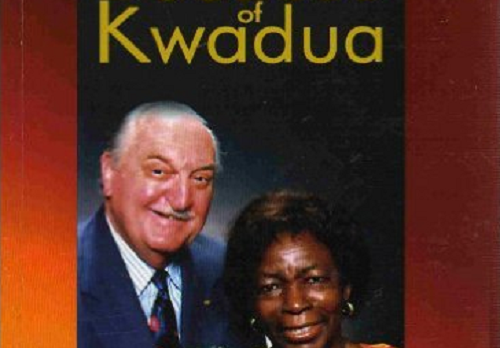
Book review....Because of Kwadua
An autobiography in honour of love, Because of Kwadua, is an easy read of love in the colonial and immediate independent Ghana from the late 40s to the late 60s.
Set in the capital city of the country, Accra, and the Golden city, Kumasi, and their environs, the author, Hans Rudolf Roth recounts the stoic love of Kwadua, his wife, as he forays into work, experiences and making a living in Ghana at the time as a white.
Dedicated to his wife, the book gives the experiences of the author in newly independent Ghana and the trajectory thereafter.
The experiences are a mixed bag of love, life in Ghana and the challenges of living, as well as various cultural and traditional brushes, with the racial undertones from Ghanaians and even expatriates, when he begins his love rides on a motorbike with Kwadua clutching at him from behind.
Upheavals
Divided into 43 chapters, Because of Kwadua touches on some interesting social, political and economic issues of the time.
For instance, the author gives readers a taste of Ghana under colonial rule and nationalist agitation.
He lets readers in on his encounter with Kwame Nkrumah as a young politician and portrays him as human, with Ghanaians and some expatriates enthralled at the mere sight of him.
The Coussey Constitutional Committee report of October 1949 and the reaction of Kwame Nkrumah and his supporters, the coining of the slogan “positive action” as the rallying call for independence by the Convention Peoples’ Party (CPP) culminates in a confrontation between the CPP and the colonial administration.
We read about the conscription of expatriate employees of foreign companies such as ???SAT, UAC, UTC, CFAO and SCOA???, except the heads of these businesses.
Hans Rudolf Roth becomes the head of one of the units of the special constables formed to maintain peace and order during nationalists’ agitations.
His humour comes through the narration of a serious political impasse of the time: “We were made to fall in line, to march, turn left and turn right. The result was utter confusion. Some portly Lebanese completely misunderstood, or perhaps pretended to misunderstand the commands barked out by a police sergeant. They strode on whilst other [sic] stood still; they refused to budge when they should have marched.”
He weds his sweetheart, Mercy Kwadua Kwafo in January 1957, the same year that the country gains independence.
As the author settles into fatherhood, life and work in Kumasi and Accra, Dr Kwame Nkrumah settles into the management of the country.
Hans Rudolf Roth navigates the reader through the turbulence of the period, the unfair policies of Nkrumah, including his “scientific socialism”, and some foreign policy manoeuvres that resulted in his visit to the Upper Volta (now Burkina Faso) to strengthen ties with President Yameoga, where a hand grenade was thrown at Kulungugu.
Of Nkrumah’s socialism, Hans Rudolph Roth has this to say, “I was appalled by the type of socialism acclaimed by Nkrumah’s party, the CPP. I could not help to notice that most of the leaders of the party, whilst paying lip service to this hybrid concept of socialism, were amassing wealth for themselves.”
Socially and economically, Ghana’s fortunes through the pages of the book remind readers that Ghana’s socio-economic challenges have deep roots.
Hans Rudolf Roth describes how foreign organisations were squeezed out of government business because of their refusal to pay the 10 per cent “which contract awarding officials demanded, purportedly in support of the CPP coffers.”
It resulted in some closing down their operations in Ghana and relocating to Sierra Leone.
Hans Rudolph Roth breaks the myth of Nkrumah sourcing funds for the building of the Akosombo Dam from the Soviet Union.
He states “… the US government approved the loans for the realisation of the Volta River Authority.”
Racial
Racial issues are also tackled honestly in the book.
Hans Rudolf Roth recounts the negative expressions of his compatriots at his friendship with Idun, a Ghanaian he met during his train trip from Accra to Kumasi when he first came into the country.
Interesting
Interesting pieces of information picked up from the book are the construction of the Kumasi Sports Stadium by the United African Company (UAC) as a gift to Ghanaians to mark independence, the cycling competition organised and the subsequent formation of the Kumasi Cycling Club, which was later disbanded by the Director of Sports at the time, Ohene Djan; Prof. K. A. Busia’s legislative fortunes, winning the Wenchi seat convincingly in 1954, Kwame Nkrumah’s development strides, the exclusion of areas opposed to him in the development effort, the formation of the National Liberation Movement (NLM ) with the slogan ‘ma te me ho’, with the ensuing street fights in Kumasi.
Because of Kwadua gives some historical perspectives not captured in textbooks. It is a compendium of facts as observed by the author during the period and is an invaluable resource that sets the history of the country in an objective context.
Another sterling publication by Afram Publications, Because of Kwadua, is an interesting read and can be found in all leading bookshops in the country.
The publication is another testimony of the expertise of the publication sector in Ghana, with clear prints, legible fonts and a fair amount of interesting pictures showing some areas of the city during colonial times.
Reviewer’s email:
